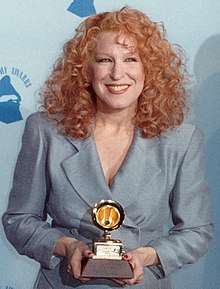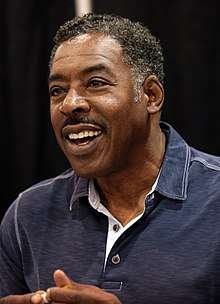1945 in the United States
Events from the year 1945 in the United States. World War II ended during this year following the surrender of Germany in May and that of Japan in September.
| |||||
| Decades: |
| ||||
|---|---|---|---|---|---|
| See also: | |||||
Incumbents
Federal Government
- President: Franklin D. Roosevelt (D-New York) (until April 12), Harry S. Truman (D-Missouri) (starting April 12)
- Vice President:
- until January 20: Henry A. Wallace (D-Iowa)
- January 20–April 12: Harry S. Truman (D-Missouri)
- starting April 12: vacant
- Chief Justice: Harlan F. Stone (New York)
- Speaker of the House of Representatives: Sam Rayburn (D-Texas)
- Senate Majority Leader: Alben W. Barkley (D-Kentucky)
- Congress: 78th (until January 3), 79th (starting January 3)
Events
January
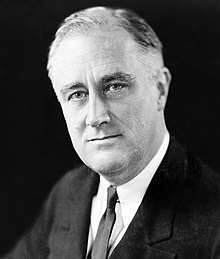
Franklin D. Roosevelt, the President of the United States, began his fourth term on January 20
- January – American troops cross the Siegfried Line into Belgium.
- January 6 – Naval lieutenant George H. W. Bush, future President of the United States, and future First Lady Barbara Pierce marry in Rye, New York.
- January 20 – Franklin D. Roosevelt is inaugurated to an unprecedented fourth term as President of the United States. No president before, or since, reaches a third term in office.
- January 30 – Raid at Cabanatuan: 121 American soldiers and 800 Filipino guerrillas free 813 American POWs from the Japanese-held camp at Cabanatuan City, Philippines.
- January 31 – Eddie Slovik is executed by firing squad for desertion, the first American soldier since the American Civil War, and last to date to be executed for this offense.
February
_(B%26W).jpg)
February 4–11: Yalta Conference
- February 2 – WW II: President Franklin D. Roosevelt and British Prime Minister Winston Churchill leave to meet with Soviet leader Joseph Stalin at the Yalta Conference.
- February 3 – United States forces capture Manila, Philippines from the Japanese Imperial Army.
- February 4 – WW II: President Franklin D. Roosevelt, Prime Minister of the United Kingdom Winston Churchill and Soviet leader Joseph Stalin begin the Yalta Conference (ends February 11).
- February 7 – WW II: General Douglas MacArthur returns to Manila.
- February 16
- Combined American and Filipino forces recapture the Bataan Peninsula.
- American and Filipino ground forces land on Corregidor Island in the Philippines.
- February 19 – WW II – Battle of Iwo Jima: About 30,000 United States Marines land on Iwo Jima.
- February 23
- The American and Filipino troops enter Intramuros, Manila.
- The capital of the Philippines, Manila, is liberated by combined American and Filipino ground troops.
- Battle of Iwo Jima: A group of United States Marines reach the top of Mount Suribachi on the island and are photographed raising the American flag. The photo, Raising the Flag on Iwo Jima (taken by Joe Rosenthal), later wins a Pulitzer Prize.
March
- March 1 – United States President Franklin D. Roosevelt gives what will be his last address to a joint session of Congress, reporting on the Yalta Conference.
- March 2 – Former Vice President Henry Agard Wallace starts his term of office as U.S. Secretary of Commerce, serving under President Roosevelt.
- March 3 – WW II: United States and Filipino troops take Manila, Philippines.
- March 7 – WW II: American troops seize the bridge over the Rhine River at Remagen, Germany and begin to cross.
- March 15 – The 17th Academy Awards ceremony is held, broadcast via radio for the first time. Best Picture goes to Going My Way.
- March 19 – WW II: Off the coast of Japan, bombers hit the aircraft carrier USS Franklin, killing about 800 of her crewmen and crippling the ship.
- March 24 – The cartoon character Sylvester the cat debuts in Life with Feathers
- March 29 – The "Clash of Titans" in basketball: George Mikan and Bob Kurland duel at Madison Square Garden as OSU defeats DePaul 52–44.
April
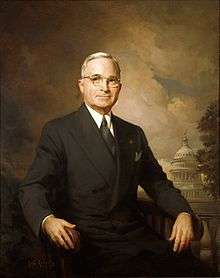
April 12: Harry S. Truman becomes President upon the death of Franklin D. Roosevelt
- April 1 – WWII – Battle of Okinawa: United States troops land on Okinawa.
- April 4 – WWII – American troops liberate their first Nazi concentration camp, Ohrdruf death camp in Germany.
- April 7 – The only flight of the German ramming unit known as the Sonderkommando Elbe takes place, resulting in the loss of some 24 B-17s and B-24s of the United States Eighth Air Force.
- April 12 – President Franklin D. Roosevelt dies suddenly at Warm Springs, Georgia; Vice President Harry S. Truman becomes the 33rd President.
- April 18 – The American war correspondent Ernie Pyle is killed by Japanese machine gun fire on the island of Ie Shima off Okinawa.
- April 19 – Rodgers and Hammerstein's Carousel, a musical play based on Ferenc Molnár's Liliom, opens on Broadway and becomes their second long-running stage classic.
- April 25
- WWII – Elbe Day: United States and Soviet troops link up at the Elbe River, cutting Germany in two.
- Founding negotiations for the United Nations begin in San Francisco.
- April 27 – U.S. Ordnance troops find the coffins of 18th-century Prussian kings Frederick Wilhelm I and Frederick the Great, in addition to German President Paul Von Hindenburg and his wife.
May
- May 3 – Rocket scientist Wernher von Braun and 120 members of his team surrender to U.S. forces (later he became at the forefront and a pioneer of the U.S. space program).
- May 5
- A Japanese Fu-Go balloon bomb kills five children and a grown woman, Elsie Mitchell, near Bly, Oregon, when it explodes as they drag it from the woods. They are the only people killed by an enemy attack on the American mainland during World War II.
- The US 11th Armored Division liberates the prisoners of Mauthausen concentration camp, including Simon Wiesenthal.
- Ezra Pound, the poet and author, is arrested by American soldiers in Italy for treason.
- May 8 – Victory in Europe Day: The Allies accept Germany's unconditional surrender.
- May 9 – Hermann Göring is captured by the United States Army; Norway arrests the traitor Vidkun Quisling.
June
July
- July 8 – WW II: President Harry S. Truman is informed that Japan will talk peace if it can retain the reign of the Emperor.[1]
- July 16 – The Trinity test detonates the world's first atomic bomb.
- July 21 – WW II: President Harry S. Truman approves the order for atomic bombs to be used against Japan.[1]
- July 28 – A U.S. Army Air Forces B-25 bomber crashes into the Empire State Building, killing 14 people, including all on board.
- July 30 – WW II: The heavy cruiser USS Indianapolis is hit and sunk by torpedoes from the I-58 in the Philippine Sea. Some 900 survivors jump into the sea and are adrift for up to four days. Nearly 600 die before help arrives. Captain Charles B. McVay III of the cruiser is later court-martialed and convicted.
August
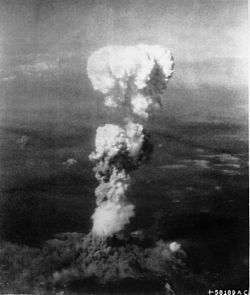
August 6: Atomic bombing of Hiroshima
- August 6 – WW II: Atomic bombing of Hiroshima: The United States drops an atomic bomb (nicknamed "Little Boy") on Hiroshima, Japan, at 8:15 a.m. (local time). This sent shockwaves throughout the world as the first atomic bomb used on civilians.
- August 7 – President Harry Truman announces the successful bombing of Hiroshima with the atomic bomb, while returning from the Potsdam Conference aboard the U.S. Navy heavy cruiser USS Augusta in the middle of the Atlantic Ocean.
- August 8 – The United Nations Charter is ratified by the United States Senate, and this nation becomes the third one to join the new international organization.
- August 9 – The United States drops an atomic bomb nicknamed "Fat Man" on Nagasaki, Japan, at 11:02 a.m. (local time).
- August 14 (August 15 in Japan) – Emperor Hirohito announces Japan's surrender on the radio. The United States calls this day V-J Day (Victory over Japan). This ends the period of Japanese expansionism and begins the period of Occupied Japan.
- August 17 – The United States and the U.S.S.R. split up the Korean Peninsula making North Korea and South Korea
September
- September 2
- World War II ends: The final official surrender of Japan is accepted by the Supreme Allied Commander, General Douglas MacArthur, and Fleet Admiral Chester Nimitz for the United States, and delegates from Australia, New Zealand, the United Kingdom, The Netherlands, China, and others from a Japanese delegation led by Mamoru Shigemitsu, on board the American battleship USS Missouri in Tokyo Bay (but in Japan August 14 is recognized as the day the Pacific War ended).
- Japanese general Tomoyuki Yamashita surrenders to Filipino and American forces at Kiangan, Ifugao.
- September 5
- The Russian code clerk Igor Gouzenko comes forward with numerous documents implicating the Soviet Union in numerous spy rings in North America: both in the United States and in Canada.
- Iva Toguri D'Aquino, a Japanese-American suspected of being wartime radio propagandist "Tokyo Rose", is arrested in Yokohama.
- September 8 – American troops occupy southern Korea, while the Soviet Union occupies the north, with the dividing line being the 38th parallel of latitude. This arrangement proves to be the indirect beginning of a divided Korea.
- September 9 – The first actual case of a (computer) bug being found, is a moth lodged in a relay of a Harvard Mark II computer at the Naval Weapons Center in Dahlgren, Virginia.
- September 20 – The Office of Strategic Services (OSS) is disbanded and split up among several other agencies.
October
- October 3–10 – The Detroit Tigers win the World Series against the Chicago Cubs.
- October 5 – A strike by the Set Decorator's Union in Hollywood results in a riot.
- October 23 – Jackie Robinson signs a contract with the Montreal Royals.
- October 29 – At Gimbel's Department Store in New York City, the first ballpoint pens go on sale at $12.50 each.
November
- November 15 – Harry S. Truman, Clement Attlee, and Mackenzie King call for a U.N. Atomic Energy Commission.[1]
- November 16 – Cold War: The United States controversially imports 88 German scientists to help in the production of rocket technology.
December
- December 4 – By a vote of 65–7, the United States Senate approves the entry of the United States into the United Nations.[2]
- December 21 – General George S. Patton dies from injuries sustained in a car accident on December 9.
Undated
- The U.S. House of Representatives calls for unrestricted Jewish immigration to Palestine in order to establish a Jewish commonwealth there.
- The Berklee College of Music is founded in Boston.
- Russian-American physicist Vladimir Kosma Zworykin coauthors Electron Optics and the Electron Microscope.
Ongoing
- World War II, U.S. involvement (1941–1945)
Births
January
- January 1 – Diahnne Abbott, American actress and singer
- January 3 – Stephen Stills, American rock singer, songwriter (Crosby, Stills, Nash & Young)
- January 4 – Richard R. Schrock, American chemist, recipient of the Nobel Prize in Chemistry in 2005
- January 6 – Allen Appel, American author, illustrator, and photographer
- January 7 – Tony Conigliaro, American baseball player (d. 1990)
- January 10 – Steven P. Perskie, American politician, judge
- January 15 – Vince Foster, American deputy White House counsel during the first term of President Bill Clinton (d. 1993)
- January 20
- Dave Boswell, American baseball player (d. 2012)
- Robert Olen Butler, American writer
- Susan Rothenberg, American painter[3]
- January 22 – Jophery Brown, American baseball player, actor and stuntman (d. 2014)
- January 25 – Leigh Taylor-Young, American actress
- January 28
- Karen Lynn Gorney, American actress (Saturday Night Fever)
- Chuck Pyle, American country-folk singer-songwriter (d. 2015)
- January 29 – Tom Selleck, American actor (Magnum, P.I.)
- January 30 – Michael Dorris, American author (d. 1997)
- January 31 – Joseph Kosuth, American artist
February
- February 3 – Bob Griese, American football player
- February 9 – Mia Farrow, American actress
- February 12 – David D. Friedman, American economist
- February 14 – Carl Bernstein, American investigative journalist and author
- February 15 – Douglas Hofstadter, American cognitive scientist
- February 17 – Zina Bethune, American actress, dancer and choreographer (d. 2012)
- February 20 – Henry Polic II, American actor (d. 2013)
- February 22 – Oliver, American singer (Good Morning Starshine) (d. 2000)
- February 24 – Barry Bostwick, American actor
- February 25 – Roy Saari, American swimmer (d. 2008)
- February 27 – Carl Anderson, American singer, actor (Jesus Christ Superstar) (d. 2004)
- February 28 – Bubba Smith, American football player, actor (d. 2011)
March
- March 1 – Dirk Benedict, American actor
- March 2 – Joy Garrett, American actor and vocalist (d. 1993)
- March 3 – Hattie Winston, American actress
- March 4 – Gary Williams, American basketball coach
- March 7 – Arthur Lee, American musician (d. 2006)
- March 8
- Jim Chapman, American politician
- Micky Dolenz, American actor, director and rock musician (The Monkees)
- March 9 – Dennis Rader, American serial killer
- March 12 – Sammy Gravano, American mobster
- March 14
- Michael Martin Murphey, American singer-songwriter and guitarist
- Walter Parazaider, American saxophonist (Chicago)
- March 20
- Bobby Jameson, American singer, songwriter (d. 2015)
- Pat Riley, American basketball coach
- March 21 – Charles Greene, American Olympic athlete
- March 22 – Sheila Frahm, American politician
- March 24 – Curtis Hanson, American film director, screenwriter (d. 2016)
- March 29 – Walt Frazier, African-American basketball player
- March 31
- Edwin Catmull, American computer scientist
- Gabe Kaplan, American actor, comedian, and professional poker player
April
- April 2 – Linda Hunt, American actress
- April 9 – Peter Gammons, American baseball sportswriter
- April 10 – Shirley Walker, American composer and conductor for film and television (d. 2006)
- April 13
- Tony Dow, American actor, producer, and director (Leave It to Beaver)
- Lowell George, American rock musician (Little Feat) (d. 1979)
- Bob Kalsu, American football player (d. 1970)
- April 20 – Steve Spurrier, American football player and coach
- April 24
- Doug Clifford, American drummer
- Robert Knight, American singer (d. 2017)
- Bob Lunn, American golfer
- April 25 – Stu Cook, American bassist
- April 27 – August Wilson, American playwright (d. 2005)
- April 29 – Tammi Terrell, African-American soul singer (d. 1970)
- April 30 – Mike Smith, American astronaut (d. 1986)
May
- May 1 – Rita Coolidge, American pop singer
- May 3 – Jeffrey C. Hall, American geneticist and chronobiologist, recipient of the Nobel Prize in Physiology or Medicine in 2017
- May 5
- Chuck Holmes, American adult film producer (d. 2000)
- Kurt Loder, American film critic, author and television personality
- May 6
- Jimmie Dale Gilmore, American musician
- Bob Seger, American rock singer (Old Time Rock and Roll)
- May 8 – Keith Jarrett, American musician
- May 21 – Richard Hatch, American actor (Battlestar Galactica) (d. 2017)
- May 22 – Victoria Wyndham, American actress (Another World)
- May 23 – Lauren Chapin, American child actress, evangelist
- May 24 – Priscilla Wagner, American actress, businesswoman and wife of singer Elvis Presley
- May 28
- Patch Adams, American physician, comedian, social activist, clown and author
- John Fogerty, American rock singer (Creedence Clearwater Revival)
- Gary Stewart, American singer (d. 2003)
- May 30
- Andrea Bronfman, American philanthropist (d. 2006)
- Gladys Horton, American singer (The Marvelettes) (d. 2011)
June
- June 1 – Frederica von Stade, American mezzo-soprano
- June 2 – Jon Peters, American film producer
- June 3 – Hale Irwin, American professional golfer
- June 4 – Anthony Braxton, American composer, musical instrumentalist
- June 5
- John Carlos, American athlete
- Don Reid, American country singer (The Statler Brothers)
- June 6 – David Dukes, American actor (d. 2000)
- June 7 – Billy Butler, American singer, songwriter (d. 2015)
- June 8 – Steven Fromholz, American singer, songwriter (d. 2014)
- June 11 – Adrienne Barbeau, American actress, television personality and author (Maude)
- June 13 – Rodney P. Rempt, American admiral
- June 16 – Chip Damiani, American drummer (The Remains) (d. 2014)
- June 17
- Frank Ashmore, American actor
- Art Bell, American radio talk show host (Coast to Coast AM) (d. 2018)
- June 19 – Greil Marcus, American music journalist, cultural critic
- June 23 – Jim Fouratt, American gay activist, entertainer
- June 24 – George Pataki, Governor of New York
- June 25
- Carolyn Cheeks Kilpatrick, American politician
- Carly Simon, American singer, songwriter (You're So Vain)
- June 26 – Dwight York, American musician, fashion consultant, cult leader, and child molester
- June 27 – Norma Kamali, American fashion designer
- June 30
- Jerry Kenney, American Major League Baseball infielder
- James Snyder Jr., American author, attorney and politician
July
- July 1
- Mike Burstyn, American actor and singer
- Debbie Harry, American singer (Blondie)
- Billy Rohr, American Major League Baseball player
- July 2 – Linda Warren, American author
- July 6 – Burt Ward, American actor and activist (Batman)
- July 9 – Dean Koontz, American novelist
- July 10 – Ron Glass, African-American actor (Barney Miller) (d. 2016)
- July 11 – Richard Wesley, American playwright, screenwriter
- July 12
- Edwin Neal, American actor
- Larry Zierlein, American football coach
- July 13
- Robert H. Foglesong, U.S. General
- Danny Abramowicz, American football player, coach
- July 15 – Jan-Michael Vincent, American actor (d. 2019)
- July 18
- Boomer Castleman, American singer, songwriter (d. 2015)
- Pat Doherty, American politician
- July 20
- Kim Carnes, American singer, songwriter (Bette Davis Eyes)
- Larry Craig, American politician
- July 28 – Jim Davis, American cartoonist (Garfield)
- July 30
- Lloyd Carr, American football coach
- Roger Dobkowitz, American game show producer
- July 31 – William Weld, American politician
August
- August 1 – Douglas Osheroff, American physicist, recipient of the Nobel Prize in Physics in 1996
- August 2 – Joanna Cassidy, American actress
- August 4 – Alan Mulally, American businessman, CEO of the Ford Motor Company
- August 5 – Loni Anderson, American actress (WKRP in Cincinnati)
- August 7 – Alan Page, American football player
- August 12 – J. D. McClatchy, American poet and literary critic (d. 2018)
- August 14 – Steve Martin, American actor, comedian
- August 15
- Duffy Dyer, American baseball player and coach
- Gene Upshaw, American football player (d. 2008)
- August 20 – Jonathan Goodson, American television game show producer, son of Mark Goodson
- August 22
- David Chase, American writer, director and television producer
- Ron Dante, American rock singer, songwriter and record producer (The Archies)
- Steve Kroft, American journalist, correspondent (60 Minutes)
- August 24
- Marsha P. Johnson, born Malcolm Michaels Jr., African-American gay liberation activist and drag queen (d. 1992)
- Vince McMahon, American professional wrestling promoter, chairman and CEO of WWE
- August 26
- August 29 – Wyomia Tyus, American Olympic athlete
- August 31 – Bob Welch, American musician (d. 2012)
September
- September 4 – Danny Gatton, American guitarist (d. 1994)
- September 8 – Ron "Pigpen" McKernan, American musician (d. 1973)
- September 9 – Doug Ingle, American singer, songwriter
- September 12
- Russell "Jungle Jim" Liberman, American drag racer (d. 1977)
- Richard Thaler, American economist, recipient of the Nobel Memorial Prize in Economic Sciences in 2017
- September 14 – Benjamin Harjo Jr., Native American artist
- September 15 – Jessye Norman, African-American operatic soprano (d. 2019)
- September 16 – Pat Stevens, American voice actress (d. 2010)
- September 17 – Phil Jackson, American basketball coach
- September 18 – P. F. Sloan, American singer, songwriter (d. 2015)
- September 19 – Randolph Mantooth, American actor, motivational speaker (Emergency!)
- September 20
- Candy Spelling, American socialite, writer
- Laurie Spiegel, American electronic composer
- September 21 – Kay Ryan, American poet
- September 23 – Paul Petersen, American child actor, advocate for other child actors
October
- October 1 – Donny Hathaway, African-American soul singer, songwriter (d. 1979)
- October 2 – Don McLean, American rock singer, songwriter (American Pie)
- October 3 – Kay Baxter, American bodybuilder (d. 1988)
- October 4 – Clifton Davis, African-American actor, minister (Amen)
- October 12 – Dusty Rhodes, American wrestler (d. 2015)
- October 13 – Susan Stafford, American television presenter
- October 15 – Jim Palmer, American baseball player
- October 18 – Huell Howser, American television personality, host of California's Gold (d. 2013)
- October 19 – John Lithgow, American actor (Third Rock from the Sun)
- October 20 – George Wyner, American actor
- October 22 – Buzz Potamkin, American television producer (d. 2012)
- October 24
- Eugenie Scott, American Executive Director of the National Center for Science Education
- Sean Solomon, American Principal Investigator of NASA's MESSENGER mission to Mercury
- October 25 – David Schramm, American astrophysicist (d. 1997)
- October 26
- Pat Conroy, American author (d. 2016)
- Jaclyn Smith, American actress
- October 27 – Carrie Snodgress, American actress (d. 2004)
- October 29
- Melba Moore, African-American singer, actress (Hair)
- Daniel Albright, American literary critic and musicologist
- October 30
- Ron Slinker, American wrestler (d. 2008)
- Henry Winkler, American actor, director, producer and author
- October 31 – Brian Doyle-Murray, American actor (Saturday Night Live)
November

James Avery
- November 7 – Bob Englehart, American editorial cartoonist
- November 12
- Michael Bishop, American author
- Tracy Kidder, American journalist and author
- November 21 – Goldie Hawn, American actress, producer and singer (Rowan and Martin's Laugh-In)
- November 22 – Robert Ben Rhoades, American serial killer, rapist known as "The Truck Stop Killer"
- November 23 – Jerry Harris, American sculptor
- November 25
- Gail Collins, American journalist and author
- Mary Jo Deschanel, American actress
- November 26 – Daniel Davis, American actor
- November 27
- Barbara Anderson, American actress
- James Avery, African-American actor (d. 2013)
- November 30
- Linda Bove, American actress
- Billy Drago, American actor (d. 2019)
December
- December 1 – Bette Midler, American actress and singer[4]
- December 2 – Charles "Tex" Watson, American prisoner, 'Manson Family' member
- December 6 – Larry Bowa, American baseball player, manager
- December 9 – Michael Nouri, American actor
- December 13
- Herman Cain, African-American conservative politician, author, business executive, radio host, syndicated columnist, and Tea Party activist (d. 2020)
- Kathy Garver, American actress, author and online radio hostess
- Heather North, American actress (d. 2017)
- December 16 – Patti Deutsch, American voice actress (d. 2017)
- December 17
- Ernie Hudson, African-American actor
- Chris Matthews, American news anchor
- December 18 – Carolyn Wood, American professional swimmer
- December 19 – Elaine Joyce, American actress, game show panelist
- December 20
- Bruce Baker, American geneticist (d. 2018)
- Peter Criss, American rock drummer (KISS)
- December 22
- Diane Sawyer, American news journalist
- T. K. Wetherell, American politician, educator (d. 2018)
- December 23 – Donald A. Ritchie, American historian
- December 24 – Nicholas Meyer, American screenwriter, producer, director and novelist
- December 25 – Gary Sandy, American actor
- December 26 – John Walsh, American media personality (America's Most Wanted)
Date Unknown
- full date unknown – David M. Alexander, science fiction and mystery author
Deaths
- January 3 – Edgar Cayce, mysticist (born 1877)
- January 7
- Alexander Stirling Calder, sculptor (born 1870)
- Thomas McGuire, fighter ace (born 1920; killed in action)
- January 13 – Margaret Deland, novelist (born 1857)
- January 22 – Blind Willie Johnson, African American gospel singer and guitarist (born 1897; pneumonia)
- January 23 – Newton E. Mason, U.S. Navy rear admiral (born 1850)
- January 30 – Herbert L. Clarke, cornet virtuoso (born 1867)
- January 31 – Eddie Slovik, soldier (born 1920; executed for desertion)
- February 2 – Joe Hunt, tennis player (born 1919; killed in naval aviation accident)
- February 5 – Volga Hayworth, showgirl (born c. 1898)
- February 11 – Al Dubin, songwriter (born 1891 in Switzerland)
- March 4
- Lucille La Verne, actress (born 1872)
- Mark Sandrich, film director (born 1900)
- March 30 – Maurice Rose, U.S. Army general (born 1899; killed in action)
- March 31 – Harriet Boyd Hawes, archaeologist (born 1871)
- April 10 – Gloria Dickson, actress (born 1917; killed in domestic fire)
- April 12 – Franklin D. Roosevelt, 32nd President of the United States from 1933 to 1945 (born 1882)
- April 17 – Ernie Pyle, journalist (born 1900)
- April 29 – Malcolm McGregor, silent film actor (born 1892)
- April 30 – William Orlando Darby, U.S. Army colonel, creator of the Rangers (born 1911; killed in action)
- May 14 – Heber J. Grant, 7th President of The Church of Jesus Christ of Latter-day Saints (born 1856)
- May 17 – Bobby Hutchins, Our Gang films child actor (born 1925; killed in military aviation accident)
- May 18 – William Joseph Simmons, founder of the second Ku Klux Klan (born 1880)
- June 16 – Henry Bellamann, author (born 1882)
- June 18 – Simon Bolivar Buckner, Jr., U.S. Army general (born 1886; killed in action at Battle of Okinawa)
- 20 June – Bruno Frank, German author, poet, dramatist and humanist (born 1887)
- July 13 – Alla Nazimova, scriptwriter and actress (born 1879 in Crimea)
- July 16 – Addison Randall, Western film actor (born 1906)
- July 25 – Charles Gilman Norris, novelist (born 1881)
- August 9 – Harry Hillman, track athlete (born 1881)
- August 10 – Robert H. Goddard, rocket scientist (born 1882)
- August 25 – Willis Augustus Lee, U.S. Navy admiral and Olympic shooter (born 1888; heart attack on active service)
- September 1 – Frank Craven, actor (born 1881)
- September 6 – John S. McCain Sr., U.S. Navy admiral (born 1884; heart attack on active service)
- September 20 – Jack Thayer, survivor of the sinking of the RMS Titanic (born 1894)
- September 26 – A. Peter Dewey, soldier, first American casualty in Vietnam (born 1916)
- October 1 – Walter Bradford Cannon, physiologist (born 1871)
- October 13 – Milton S. Hershey, chocolate tycoon (born 1857)
- October 24 – Charles D. Barney, stockbroker (born 1844)
- October 28 – Gilbert Emery, film actor and author (born 1875)
- November 7 – Gus Edwards, songwriter (born 1879 in Germany)
- November 11 – Jerome Kern, popular composer (born 1885)
- November 21
- Robert Benchley, humorist, theater critic and actor (born 1889)
- Ellen Glasgow, novelist (born 1873)
- Alexander Patch, U.S. Army general (born 1889; pneumonia on active service)
- November 23 – Charles Armijo Woodruff, U.S. Navy officer and 11th Governor of American Samoa from 1914 to 1915 (born 1884; suicide)
- November 25 – Doris Keane, stage actress (born 1881)
- November 26 – Johnny Jenkins, auto racing driver (born 1875 in Wales)
- November 28 – Dwight F. Davis, tennis player (born 1879)
- December 4 – Thomas Hunt Morgan, biologist, geneticist and embryologist, recipient of the Nobel Prize in Physiology or Medicine in 1933 (born 1866)
- December 21 – George S. Patton, U.S. Army general (born 1885; died as result of auto accident in Germany)
- December 28 – Theodore Dreiser, novelist (born 1871)
See also
References
- "Archived copy". Archived from the original on 2010-04-06. Retrieved 2005-12-17.CS1 maint: archived copy as title (link)
- "On This Day", New York Times, retrieved 24 August 2016
- "Susan Rothenberg". FAMSF Search the Collections. 10 May 2019. Retrieved 21 February 2020.
- "Bette Midler | Biography, Music, Movies, & Facts". Encyclopedia Britannica. Retrieved 23 October 2019.
External links

This article is issued from Wikipedia. The text is licensed under Creative Commons - Attribution - Sharealike. Additional terms may apply for the media files.




%2C_Bestanddeelnr_923-6444.jpg)

.jpg)


.jpg)

.jpg)




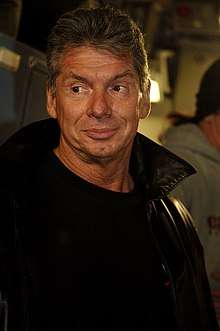
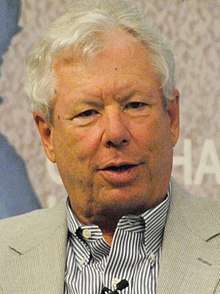
_(cropped).jpg)
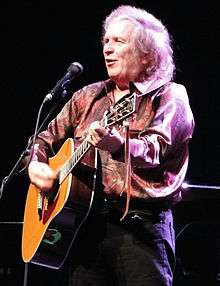
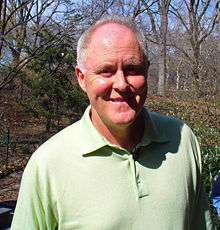
.jpg)

